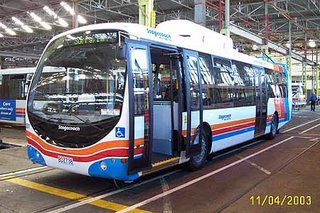Wednesday, June 07, 2006
Saving our Trolley buses

Currently there is a wrangle over their future in Wellington for several reasons. The Volvo buses really are nearing the end of their life and there is a plan to upgrade the entire 60 trolley bus fleet, however Stagecoach (who runs the buses) has been unable to sign the contract, because Land transport New Zealand and the Greater Wellington regional Council (Who fund the buses), are currently refusing to guarantee funding. LTNZ's reason is because they believe Stagecoach has a monopoly and would prefer the cheaper diesel option ($300 000 per diesel bus vs. $500 000 refurbished trolley bus), and GWRC because they have a funding shortfall of roughly $ 1 million (because LTNZ will only fund the operating costs of the trolleys as if they were diesels (so not paying for maintenance and urgent upgrade needed for the overhead wires and substations etc)
Basically because they have been under funded over the previous decades, large lump sums are needed from tax and ratepayers, and some public officials are calling for them to be scrapped all together, rather than front up with the needed costs or show leadership and decisively sort this issue out.
However with a large new wind farm going through the official process at the moment, (project West Wind, which will supply 110 000 homes -or all of Wellington) and very likely to proceed; it is possible for Wellingtons trolley bus fleet to be powered by (on average entirely) renewable energy, which is a great selling point in this age of climate change and rising oil prices.
There are a lots of reasons why the trolley buses are better than their diesel alternatives.
They don’t release diesel exhaust fumes
They are quieter
They are cleaner
They are iconic - Auckland and Dunedin got rid of their trolley bus fleets in the early 80s and now only Wellington has them in NZ. They are a symbol of a sustainable approach to transport.
They last longer -their engine life is perhaps as much as twice as long because the electric motor is more efficient than the diesel engine.
Our trolley fleet of 60 buses saves 600 000 litres of diesel - that’s a lot of foreign exchange and C02 emissions saved.


